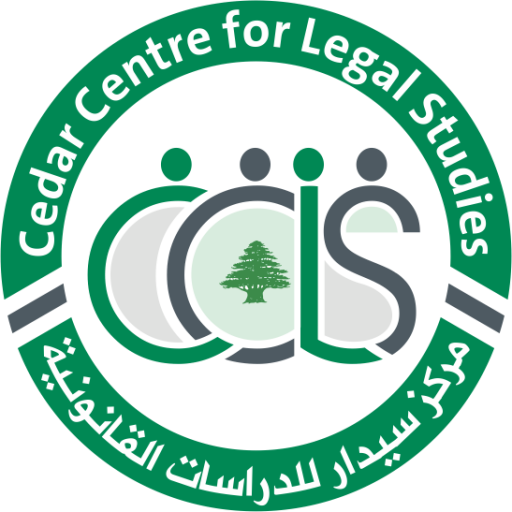Cedar Centre For Legal Studies
Case Title
Arbitrary Arrest and Torture of Rabih Fadel Zakaria
27/05/2024

27/05/2024
Introduction
This case study examines the grave injustices faced by Mr. Rabih Fadel Zakaria (ربيع فاضل زكريا), a Lebanese citizen born on 20 February 1983. Mr. Zakaria served in the Lebanese Army for over 18.5 years. His experiences highlight significant human rights violations, including torture, arbitrary detention, and wrongful dismissal.
Background
Mr. Rabih Fadel Zakaria, a dedicated member of the Lebanese Army, encountered a series of severe injustices after reporting an incident involving counterfeit money (100$) exchanged by his colleague. Despite his efforts to address the issue through appropriate channels, he faced brutal interrogation, torture, and physical abuse by the Mount Lebanon Military Police. These abuses included being blindfolded, handcuffed, deprived of food and water, and repeatedly struck.
Despite reporting the abuse internally and seeking justice, Mr. Zakaria was unfairly dismissed from the army and faced further retaliation when pursuing legal avenues for redress. His case, meticulously documented by the Cedar Centre for Legal Studies (CCLS), underscores egregious violations of international human rights standards, including the United Nations Convention Against Torture (UNCAT) and the International Covenant on Civil and Political Rights (ICCPR). Moreover, the actions against Mr. Zakaria contravene Lebanon’s anti-torture law, Law No. 65/2017, and demonstrate a clear breach of Article 47 of the Lebanese Criminal Procedure Law.”
Legal Framework
On a domestic level, on 19 September 2017, Lebanon enacted Law No. 65, which criminalizes torture. The law consists of six articles. Notably, the first article amends an existing provision in the Penal Code (Article 401) that previously criminalized “violent practices” aimed at extracting confessions. The amended article now provides a clear definition of torture. The other articles cover topics such as orders related to torture, evidence, investigation procedures, and the law’s effective date.
While in 2020, Article 47 of the Lebanese Criminal Procedure law was amended to enhance defense guarantees for detainees. It allows lawyers to be present during initial interrogations at security agencies, ensuring detainees’ access to legal representation from the moment of detention.
Despite legal reforms, the practical application of both the amended Article 47 of the Lebanese Criminal Procedure Law and Law No. 65/2017 remains challenging in Lebanon. Although over five years have passed since the enactment of the Anti-Torture Law, authorities have yet to fully implement it.
On an international level, Lebanon has ratified the International Covenant on Civil and Political Rights (ICCPR) in 1972 and the United Nation Convention against Torture (CAT) in 2000. Lebanon is also a party to the Optional Protocol to the Convention against Torture since 2008.
Despite these commitments, the implementation and enforcement of relevant laws remain inadequate.
Timeline of Events
- August 21, 2022: Mr. Zakaria reported a counterfeit money incident involving exchange with his colleague, to his superiors, without resolution.
- August 31, 2022: Summoned by the Mount Lebanon Military Police, Mr. Zakaria was tortured to force a false confession, without legal representation.
- September 1, 2022: Mr. Zakaria reported the torture to his battalion commander and was examined by a military doctor, but no action was taken.
- January 16, 2023: Summoned again by the Lebanese Army Command, he did not attend fearing further torture, resulting in his dismissal without compensation.
- January 15, 2024: Head of the Legal Support Program at CCLS, on behalf of the victim, submitted a memorandum to the Lebanese Army Command.
- April 4, 2024: Head of the Legal Support Program at CCLS, on behalf of the victim, filed a torture complaint against the Mount Lebanon Military Police investigators.
- May 21, 2024: Summoned by the Military Investigative Judge, Mr. Zakaria faced charges of promoting counterfeit money in retaliation for his complaint, leading to his arbitrary detention.
- May 22, 2024: Head of the Legal Support Program at CCLS appealed his detention, but the appeal has not yet been considered.
- May 25, 2024: CCLS sent an urgent appeal to the Working Group on Arbitrary Detention and Special Rapporteur on Torture.
- July 24, 2024: The Military Investigative Judge indicted Mr. Zakaria and referred him to trial.
- September 23, 2024: In first hearing, Mr. Zakaria was sentenced to 60 days imprisonment and therefore he was released afterwards.
Legal Violations
The actions against Mr. Zakaria violate several legal provisions:
- Lebanese Law No. 65 (2017), especially Article 5, Paragraph (3): Protection for being a complainant was violated.
- Lebanese Code of Criminal Procedures, Articles 15 and 47: Mr. Zakaria was denied legal representation on 31 August 2022.
- UNCAT, Articles 2, 4, 13, and 16: Failure to prevent torture, ensure accountability, and protect him as a complainant.
- ICCPR, Articles 7, 9, and 14: Prohibition of torture, right to liberty and security, and right to a fair trial were breached.
Mr. Zakaria’s arbitrary detention falls under categories II, III, and V of the Working Group on Arbitrary Detention’s (WGAD) working methods:
- Category II: Deprivation of liberty resulting from the exercise of fundamental rights or freedoms.
- Category III: Non-observance of international norms relating to the right to a fair trial.
- Category V: Deprivation of liberty for discriminatory reasons.
Conclusion and Requests
The case of Mr. Rabih Fadel Zakaria exemplifies severe human rights violations and the failure of Lebanese authorities to uphold international and domestic legal standards. Despite legal reforms, the practical application of laws protecting individuals from torture and ensuring fair trials remains inadequate. This case calls for immediate action to address these violations and ensure justice for Mr. Zakaria.
In light of the foregoing, on 25 May 2024 CCLS sent an urgent appeal to the Working Group on Arbitrary Detention and Special Rapporteur on Torture in order to urge the Lebanese authorities to:
- Immediate release of Mr. Rabih Fadel Zakaria from arbitrary detention.
- Conduct of a prompt, thorough, and impartial investigation into the torture and ill-treatment he endured.
- Ensure accountability for those responsible for his arbitrary detention, torture, and wrongful dismissal.
- Provision of appropriate compensation to Mr. Zakaria for the grave injustices he has suffered.
Failure to address these violations not only perpetuates Mr. Zakaria’s suffering but also undermines the fundamental principles of justice and human rights.
Updates: On 24 July 2024, the Military Investigative Judge indicted Mr. Zakaria, referring him to the court. He was specifically charged under Article 443 in conjunction with Article 440, Article 403 of the Lebanese Penal Code, and Article 166 of the Military Judiciary Code.
On 23 September 2024, during the first hearing, Mr. Zakaria was sentenced to 60 days. As he had already been detained for longer than the sentenced period, he was subsequently released.
